A Quote by Mikhail Lermontov
We almost always forgive those we understand.
Quote Topics
Related Quotes
There is a saying that to understand is to forgive, but that is an error, so Papa used to say. You must forgive in order to understand. Until you forgive, you defend yourself against the possibility of understanding. ... If you forgive, he would say, you may indeed still not understand, but you will be ready to understand, and that is the posture of grace.
You must forgive everyone. Now many would say that "We cannot forgive, it's very difficult." But it's a myth whether you forgive or don't forgive. What do you do? You don't do anything. But when you don't forgive, then you are playing into wrong hands. That means you are torturing yourself, while those who have troubled you are quite happy.
I know he did horrible things in the jungle. Things no amount of alcohol or pills could erase. War stains soldiers, all the way through their psyches, into their souls. I understand that, and could almost forgive him for taking his own life, to quiet the ghosts. But I can never forgive him for taking my mother with him.
Part of life is a quest to find that one essential person who will understand our story. But we choose wrongly so often. Over the ensuing years that person we thought understood us best ends up regarding us with pity, indifference, or active dislike. Those who truly care can be divided into two categories: those who understand us, and those who forgive our worst sins. Rarely do we find someone capable of both.
We all commit our crimes. The thing is to not lie about them -- to try to understand what you have done, why you have done it. That way, you can begin to forgive yourself. That's very important. If you don't forgive yourself you'll never be able to forgive anybody else and you'll go on committing the same crimes forever.






































